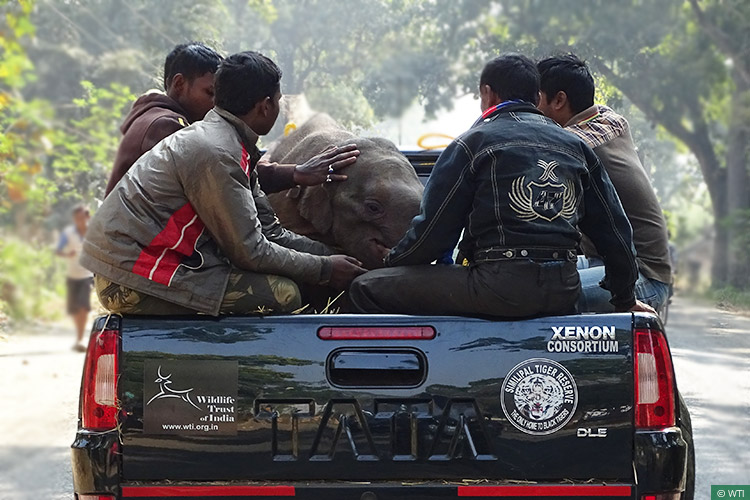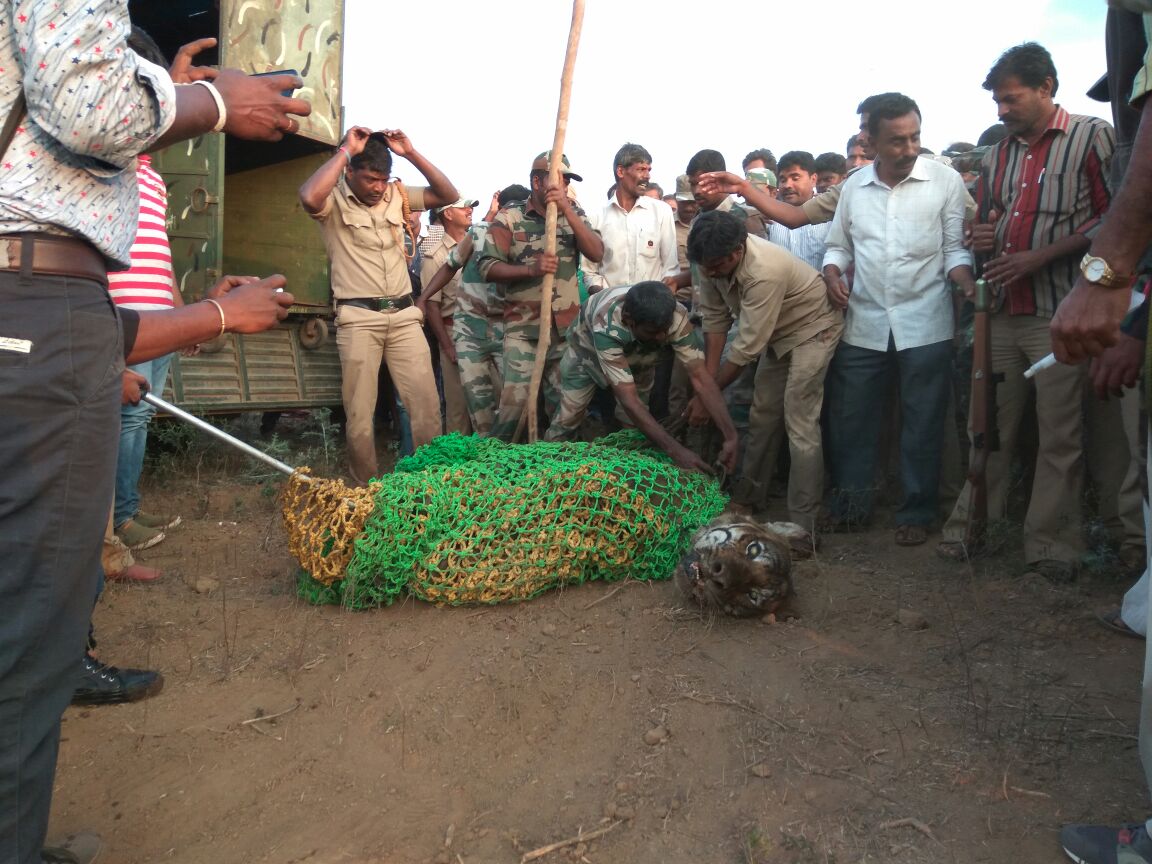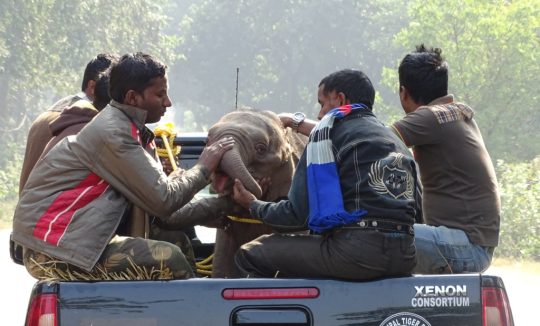Project Info
Project Description
Wildlife displacement, as defined with respect to our Big Idea of Wild Rescue and Rehabilitation, is the undesirable movement of wild animals either spatially outside their natural habitat or functionally outside their natural ecosystem role. The Mobile Veterinary Service (MVS) project envisages the deployment of trained wildlife veterinarians in important national parks and wildlife sanctuaries across India to ensure that 24×7, quality veterinary support is made available to such displaced wildlife, which is often in distress.
At its essence, the project aims at facilitating the safe and prompt return of displaced wild animals to their habitat to restore natural ecosystem functions/processes and consequently reduce biodiversity loss. This is achieved using scientifically designed and universally accepted protocols and guidelines. Non-releasable animals are sent to zoos for lifetime care and breeding.

Members of MVS unit based out of Similipal Tiger Reserve transport an elephant calf for further care
In situations of Human Wildlife Conflict, MVS teams may, on some occasions, directly intervene and manage conflict animals (direct interventions), assist local authorities in patrolling the area to reassure local communities, or treat domestic animals (both companion and livestock) that have been attacked by large carnivores (indirect interventions). Through its presence in an area, an MVS unit also helps to create awareness amongst the local populations on dealing with and responding to various conflict scenarios.
VETS ON WHEELS
Wildlife displacement can be related to natural causes such as injury or illness due disease outbreaks, or climatic events such as cyclones or the annual floods in Kaziranga National Park (where our Center for Wildlife Rehabilitation and Conservation and its allied MVS teams operate), but the biggest contributors are anthropogenic – including habitat destruction and fragmentation, and poaching and hunting for trade or local consumption. Whatever the cause, emergencies resulting from conflict between displaced wildlife and humans for space and security are a common outcome.
MVS units are a means to rapidly address reported wildlife emergencies and meet the welfare needs of distressed wild animals through rescue, rehabilitation, conservation translocations and the diagnosis and prevention of wildlife associated diseases. We have thus far deployed units in places where (some or all of) the following wildlife emergencies are reported: (i) high instances of Human Wildlife Conflict, (ii) frequent wildlife displacements due to man-made and/or natural calamities, and (iii) reports of wildlife health issues like epidemics due to infectious and non-infectious diseases.
Each MVS unit functions as a mobile wildlife ambulance and is equipped with the requisite emergency medical facilities including equipment for capture, restraint and transport, and the necessary tools to conduct basic surgeries (or if needed, necropsies) both in situ and ex situ. A trained veterinarian is in charge of the unit and is assisted by an animal keeper who doubles up as a driver and handler as the need arises. The unit is available 24×7 and has a dedicated hotline number for local people to call.
[acx_slideshow name=”Mobile Veterinary Service”]
The following activities generally fall within the ambit of an MVS unit:
- Floods, cyclones, landslides and conflict-related poisonings are some of the calamities that afflict wildlife on a regular basis. Providing emergency relief in the form of treatment, stabilisation and accommodation as required is one of the primary objectives of Mobile Veterinary Service units.
- Rehabilitation of displaced wild animals, including orphans, through the rescue centre associated with the unit.
- Conflict with leopards, elephants, and bears is on the rise and MVS vets are frequently called in to address such issues. As a vital community outreach measure aimed at mitigating conflict, vets also treat livestock that have survived attacks by large carnivores.
- MVS vets routinely provide treatment and conduct health check-ups on captive elephants that are used as working animals by state forest departments for patrolling and tourism purposes.Investigating the causes of wildlife deaths and or prevalence of certain diseases in wild populations is essential to preventing and controlling disease outbreaks. MVS veterinarians routinely conduct postmortems on wild animals to determine the cause of death and if needed implement suitable control measures.
- Thousands of livestock live on the fringes of Protected Areas in India. They pose a great threat of disease transmission to wild animals that regularly share a common interface. MVS teams organise regular immunisation camps for such livestock.
MVS BANDIPUR & SIMILIPAL: HIGHLIGHTS
Seeing the success of MVS units in Assam and Arunachal Pradesh, additional standalone units were deployed in Odisha’s Similipal Tiger Reserve in 2014 and Karnataka’s Bandipur Tiger Reserve in 2015. The operation of MVS Similipal is supported by the Similipal Tiger Conservation Foundation (STCF), a body under the management of the Government of Odisha’s Department of Environment and Forests. MVS Bandipur is supported by AIRCEL Cellular Ltd.
Since their inception, the two units have collectively attended 202 cases of wildlife displacement involving 19 species of mammals, 25 species of birds and 19 species of reptiles. These include key taxa like the Asian elephant, Bengal tiger, common leopard, sloth bear, spotted owlet, short-toed snake eagle, purple rumpled sunbird, spectacled cobra, Russell’s viper, Indian rock python, and banded krait. Over 60% of these wildlife emergencies resulted in the affected animal being released back to the wild after treatment and care.

The MVS unit in Bandipur Tiger Reserve is regularly called upon to assist the state forest department in tiger and leopard conflict cases
Aside from its regular wildlife rescue operations, MVS Similipal has been assisting the Odisha Forest Department in location, diagnosis and disposal aspects of 16 elephant deaths caused due to anthrax (as confirmed by laboratory investigations).
MVS Bandipur has provided direct interventions in 18 cases of large carnivore conflict (particularly tigers) and ensured that the conflict animal either returned to the wild or was taken to a lifetime care center (when found unfit for wild release). The unit has also performed indirect interventions in 117 cases of human-large carnivore conflict, wherein the Mobile Veterinary Service vet treated livestock that had been attacked by large carnivores and survived.
PARTNERS: Karnataka Forest Department, Odisha Forest Department, Similipal Tiger
Conservation Foundation (STCF), AIRCEL
PROJECT LEAD: Abhishek Narayanan (abhishek@wti.org.in)











